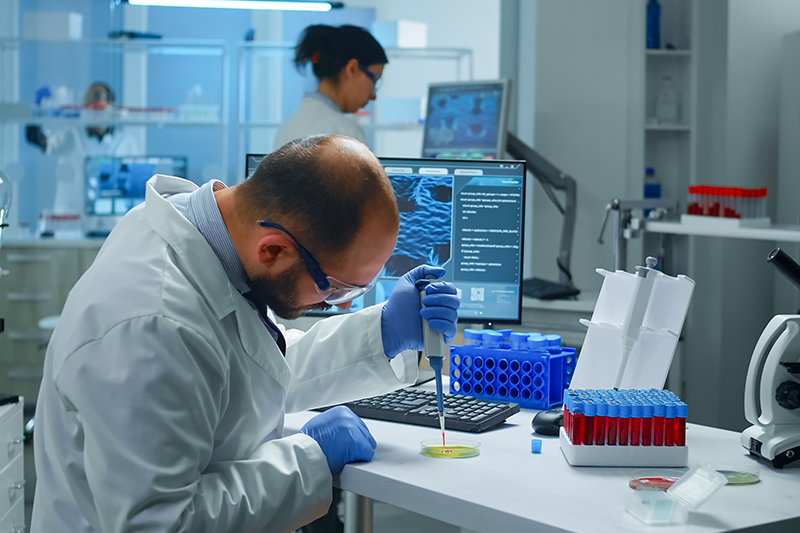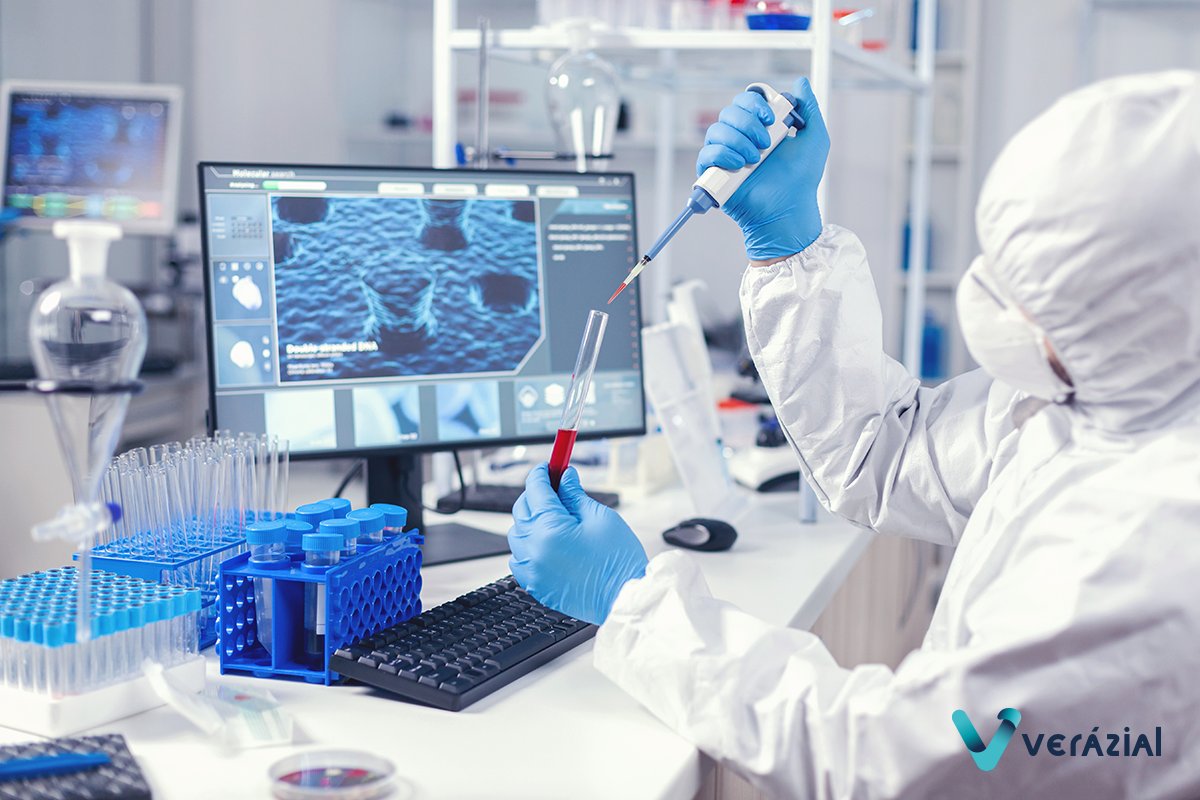GxP environments and their relevance to the pharmaceutical industry
Within GxP regulated environments, it is essential to ensure data integrity and traceability of actions throughout the supply chain. The adoption of biometric technologies, such as iris or fingerprint recognition, emerges as the solution to ensure compliance
In previous publications, we have highlighted the importance of Good Manufacturing Practices (GMP) in the pharmaceutical field. However, the pharmaceutical industry is not only limited to complying with these regulations.
Within the regulatory framework of this industry there are other regulations known as GxP, which comprise a set of best practices applied in regulated industries such as pharmaceuticals. The implementation of standards such as GLP, GCP, GDP and GMP throughout the supply chain ensures an adequate level of quality and safety for patients or consumers.
GxP is a general term used to designate various regulations applicable to different processes related to the research, production, marketing and distribution of medicines. The “x” represents a variable that fits the specific field to which it refers.
It is important to note that these regulations are mandatory in other sectors besides pharmaceutical, such as veterinary and cosmetics.
In the following, we will go deeper into the meaning of these four regulations:
GLP = Good Laboratory Practices
GLP encompasses a set of principles designed to ensure the reliability and safety of research studies in the development of new drugs, innovative dosage forms or new prescriptions.
GLP principles ensure that studies submitted to regulatory authorities meet quality and rigorous criteria. This is achieved through:
- Proper design of testing and storage areas to ensure optimal conditions.
- Regular maintenance and calibration of equipment to ensure accuracy and reliability.
- Performance of tests according to specific protocols and detailed documentation of procedures.
- Comprehensive recording and publication of the results obtained, allowing a transparent and complete evaluation by regulatory authorities.
GCP = Good Clinical Practices
GCP is an international standard that establishes ethical and scientific quality criteria for the conduct of clinical trials involving human participation in the field of medicines.
This standard covers all aspects of the process, from the planning and execution of the trial to the presentation of the results. The main objective of GCP is to ensure the protection of the rights, safety and well-being of trial participants, as well as to guarantee the credibility of the data generated, in accordance with the principles set out in the Declaration of Helsinki. By complying with GCP, the validity, integrity and adequate documentation of the data collected during the clinical trial is guaranteed.
GDP = Good Distribution Practices
GDP is a set of guidelines and standards that oversee the wholesale distribution of pharmaceutical products, ensuring their quality and safety from production to delivery to the patient. These regulations are crucial to preserve the integrity of products during transportation, storage and handling.
These regulations affect pharmaceutical companies and their logistics partners, who have responsibility for both shipping and, crucially, storage of the products. Failure to comply with these regulations at any stage of the supply chain, including intermediate points of storage and transportation, can have serious consequences on product quality.
GMP = Good Manufacturing Practices
GMP is a comprehensive set of guidelines and standards designed to ensure the quality, safety and efficacy of manufactured products in industry. These regulations cover a wide range of areas, from the selection and procurement of raw materials to the storage, processing, packaging and distribution of finished products.
Compliance with GMP is essential to ensure that pharmaceuticals, cosmetics, food and other regulated products meet established regulatory and quality requirements. This involves the implementation of standardized procedures, rigorous quality controls, personnel training, proper maintenance of equipment and facilities, as well as the constant monitoring of good practices at all stages of the manufacturing process.
In addition to ensuring product quality and safety, GMP also plays a key role in protecting public health by reducing the risk of contamination, manufacturing errors and defective products. Complying with GMP is not only a regulatory requirement, but also an assurance of consumer confidence and a demonstration of commitment to manufacturing excellence and regulatory compliance. We will explore the key aspects of GMP in more detail in a subsequent article.

GxP and data integrity
In GxP regulated environments, one of the fundamental pillars is to ensure data integrity and traceability of actions throughout the supply chain. Data integrity refers to the ability of data to be attributable, readable, contemporaneous, original, accurate, complete, consistent, available and durable, known as ALCOA+ criteria. This approach ensures reliability and confidence in the information generated at each stage of the process. Read more about this in our article Employees’ identification in the pharmaceutical industry according ALCOA+.
On the other hand, traceability of actions implies the ability to track and record every action taken, identify those responsible and document any changes or interventions along the way, both within each specific area and between the different phases of the product life cycle, from initial research to delivery to the point of sale or final consumption.
To ensure compliance with ALCOA+ criteria and guarantee traceability of actions, biometrics emerges as a valuable and effective solution. By implementing biometrics, identification is enabled through unique body characteristics, eliminating any possibility of error or identity theft. This technology not only provides exceptional convenience for users by avoiding the need for additional devices or the memorization of passwords, but also ensures traceability of actions and data integrity, in full compliance with the regulatory framework of the pharmaceutical industry. We invite you to read previous articles where we have covered more on this subject:
Find out how Verázial ID Pharma helps you in the inspection process of the FDA and other regulatory agencies, ensuring data integrity in the identification process.
Contact us for a demonstration and/or personalized study
References
- Scientist placing a blood sample into the test tube using a micropipette [Freepik]
GxP environments and their relevance to the pharmaceutical industry
Within GxP regulated environments, it is essential to ensure data integrity and traceability of actions throughout the supply chain. The adoption of biometric technologies, such as iris or fingerprint recognition, emerges as the solution to ensure compliance
In previous publications, we have highlighted the importance of Good Manufacturing Practices (GMP) in the pharmaceutical field. However, the pharmaceutical industry is not only limited to complying with these regulations.
Within the regulatory framework of this industry there are other regulations known as GxP, which comprise a set of best practices applied in regulated industries such as pharmaceuticals. The implementation of standards such as GLP, GCP, GDP and GMP throughout the supply chain ensures an adequate level of quality and safety for patients or consumers.
GxP is a general term used to designate various regulations applicable to different processes related to the research, production, marketing and distribution of medicines. The “x” represents a variable that fits the specific field to which it refers.
It is important to note that these regulations are mandatory in other sectors besides pharmaceutical, such as veterinary and cosmetics.
In the following, we will go deeper into the meaning of these four regulations:
GLP = Good Laboratory Practices
GLP encompasses a set of principles designed to ensure the reliability and safety of research studies in the development of new drugs, innovative dosage forms or new prescriptions.
GLP principles ensure that studies submitted to regulatory authorities meet quality and rigorous criteria. This is achieved through:
- Proper design of testing and storage areas to ensure optimal conditions.
- Regular maintenance and calibration of equipment to ensure accuracy and reliability.
- Performance of tests according to specific protocols and detailed documentation of procedures.
- Comprehensive recording and publication of the results obtained, allowing a transparent and complete evaluation by regulatory authorities.
GCP = Good Clinical Practices
GCP is an international standard that establishes ethical and scientific quality criteria for the conduct of clinical trials involving human participation in the field of medicines.
This standard covers all aspects of the process, from the planning and execution of the trial to the presentation of the results. The main objective of GCP is to ensure the protection of the rights, safety and well-being of trial participants, as well as to guarantee the credibility of the data generated, in accordance with the principles set out in the Declaration of Helsinki. By complying with GCP, the validity, integrity and adequate documentation of the data collected during the clinical trial is guaranteed.
GDP = Good Distribution Practices
GDP is a set of guidelines and standards that oversee the wholesale distribution of pharmaceutical products, ensuring their quality and safety from production to delivery to the patient. These regulations are crucial to preserve the integrity of products during transportation, storage and handling.
These regulations affect pharmaceutical companies and their logistics partners, who have responsibility for both shipping and, crucially, storage of the products. Failure to comply with these regulations at any stage of the supply chain, including intermediate points of storage and transportation, can have serious consequences on product quality.
GMP = Good Manufacturing Practices
GMP is a comprehensive set of guidelines and standards designed to ensure the quality, safety and efficacy of manufactured products in industry. These regulations cover a wide range of areas, from the selection and procurement of raw materials to the storage, processing, packaging and distribution of finished products.
Compliance with GMP is essential to ensure that pharmaceuticals, cosmetics, food and other regulated products meet established regulatory and quality requirements. This involves the implementation of standardized procedures, rigorous quality controls, personnel training, proper maintenance of equipment and facilities, as well as the constant monitoring of good practices at all stages of the manufacturing process.
In addition to ensuring product quality and safety, GMP also plays a key role in protecting public health by reducing the risk of contamination, manufacturing errors and defective products. Complying with GMP is not only a regulatory requirement, but also an assurance of consumer confidence and a demonstration of commitment to manufacturing excellence and regulatory compliance. We will explore the key aspects of GMP in more detail in a subsequent article.

GxP and data integrity
In GxP regulated environments, one of the fundamental pillars is to ensure data integrity and traceability of actions throughout the supply chain. Data integrity refers to the ability of data to be attributable, readable, contemporaneous, original, accurate, complete, consistent, available and durable, known as ALCOA+ criteria. This approach ensures reliability and confidence in the information generated at each stage of the process. Read more about this in our article Employees’ identification in the pharmaceutical industry according ALCOA+.
On the other hand, traceability of actions implies the ability to track and record every action taken, identify those responsible and document any changes or interventions along the way, both within each specific area and between the different phases of the product life cycle, from initial research to delivery to the point of sale or final consumption.
To ensure compliance with ALCOA+ criteria and guarantee traceability of actions, biometrics emerges as a valuable and effective solution. By implementing biometrics, identification is enabled through unique body characteristics, eliminating any possibility of error or identity theft. This technology not only provides exceptional convenience for users by avoiding the need for additional devices or the memorization of passwords, but also ensures traceability of actions and data integrity, in full compliance with the regulatory framework of the pharmaceutical industry. We invite you to read previous articles where we have covered more on this subject:
Find out how Verázial ID Pharma helps you in the inspection process of the FDA and other regulatory agencies, ensuring data integrity in the identification process.
Contact us for a demonstration and/or personalized study
References
- Scientist placing a blood sample into the test tube using a micropipette [Freepik]
GxP environments and their relevance to the pharmaceutical industry
Within GxP regulated environments, it is essential to ensure data integrity and traceability of actions throughout the supply chain. The adoption of biometric technologies, such as iris or fingerprint recognition, emerges as the solution to ensure compliance
In previous publications, we have highlighted the importance of Good Manufacturing Practices (GMP) in the pharmaceutical field. However, the pharmaceutical industry is not only limited to complying with these regulations.
Within the regulatory framework of this industry there are other regulations known as GxP, which comprise a set of best practices applied in regulated industries such as pharmaceuticals. The implementation of standards such as GLP, GCP, GDP and GMP throughout the supply chain ensures an adequate level of quality and safety for patients or consumers.
GxP is a general term used to designate various regulations applicable to different processes related to the research, production, marketing and distribution of medicines. The “x” represents a variable that fits the specific field to which it refers.
It is important to note that these regulations are mandatory in other sectors besides pharmaceutical, such as veterinary and cosmetics.
In the following, we will go deeper into the meaning of these four regulations:
GLP = Good Laboratory Practices
GLP encompasses a set of principles designed to ensure the reliability and safety of research studies in the development of new drugs, innovative dosage forms or new prescriptions.
GLP principles ensure that studies submitted to regulatory authorities meet quality and rigorous criteria. This is achieved through:
- Proper design of testing and storage areas to ensure optimal conditions.
- Regular maintenance and calibration of equipment to ensure accuracy and reliability.
- Performance of tests according to specific protocols and detailed documentation of procedures.
- Comprehensive recording and publication of the results obtained, allowing a transparent and complete evaluation by regulatory authorities.
GCP = Good Clinical Practices
GCP is an international standard that establishes ethical and scientific quality criteria for the conduct of clinical trials involving human participation in the field of medicines.
This standard covers all aspects of the process, from the planning and execution of the trial to the presentation of the results. The main objective of GCP is to ensure the protection of the rights, safety and well-being of trial participants, as well as to guarantee the credibility of the data generated, in accordance with the principles set out in the Declaration of Helsinki. By complying with GCP, the validity, integrity and adequate documentation of the data collected during the clinical trial is guaranteed.
GDP = Good Distribution Practices
GDP is a set of guidelines and standards that oversee the wholesale distribution of pharmaceutical products, ensuring their quality and safety from production to delivery to the patient. These regulations are crucial to preserve the integrity of products during transportation, storage and handling.
These regulations affect pharmaceutical companies and their logistics partners, who have responsibility for both shipping and, crucially, storage of the products. Failure to comply with these regulations at any stage of the supply chain, including intermediate points of storage and transportation, can have serious consequences on product quality.
GMP = Good Manufacturing Practices
GMP is a comprehensive set of guidelines and standards designed to ensure the quality, safety and efficacy of manufactured products in industry. These regulations cover a wide range of areas, from the selection and procurement of raw materials to the storage, processing, packaging and distribution of finished products.
Compliance with GMP is essential to ensure that pharmaceuticals, cosmetics, food and other regulated products meet established regulatory and quality requirements. This involves the implementation of standardized procedures, rigorous quality controls, personnel training, proper maintenance of equipment and facilities, as well as the constant monitoring of good practices at all stages of the manufacturing process.
In addition to ensuring product quality and safety, GMP also plays a key role in protecting public health by reducing the risk of contamination, manufacturing errors and defective products. Complying with GMP is not only a regulatory requirement, but also an assurance of consumer confidence and a demonstration of commitment to manufacturing excellence and regulatory compliance. We will explore the key aspects of GMP in more detail in a subsequent article.

GxP and data integrity
In GxP regulated environments, one of the fundamental pillars is to ensure data integrity and traceability of actions throughout the supply chain. Data integrity refers to the ability of data to be attributable, readable, contemporaneous, original, accurate, complete, consistent, available and durable, known as ALCOA+ criteria. This approach ensures reliability and confidence in the information generated at each stage of the process. Read more about this in our article Employees’ identification in the pharmaceutical industry according ALCOA+.
On the other hand, traceability of actions implies the ability to track and record every action taken, identify those responsible and document any changes or interventions along the way, both within each specific area and between the different phases of the product life cycle, from initial research to delivery to the point of sale or final consumption.
To ensure compliance with ALCOA+ criteria and guarantee traceability of actions, biometrics emerges as a valuable and effective solution. By implementing biometrics, identification is enabled through unique body characteristics, eliminating any possibility of error or identity theft. This technology not only provides exceptional convenience for users by avoiding the need for additional devices or the memorization of passwords, but also ensures traceability of actions and data integrity, in full compliance with the regulatory framework of the pharmaceutical industry. We invite you to read previous articles where we have covered more on this subject:
Find out how Verázial ID Pharma helps you in the inspection process of the FDA and other regulatory agencies, ensuring data integrity in the identification process.
Contact us for a demonstration and/or personalized study
References
- Scientist placing a blood sample into the test tube using a micropipette [Freepik]
You May Also Like
You May Also Like






